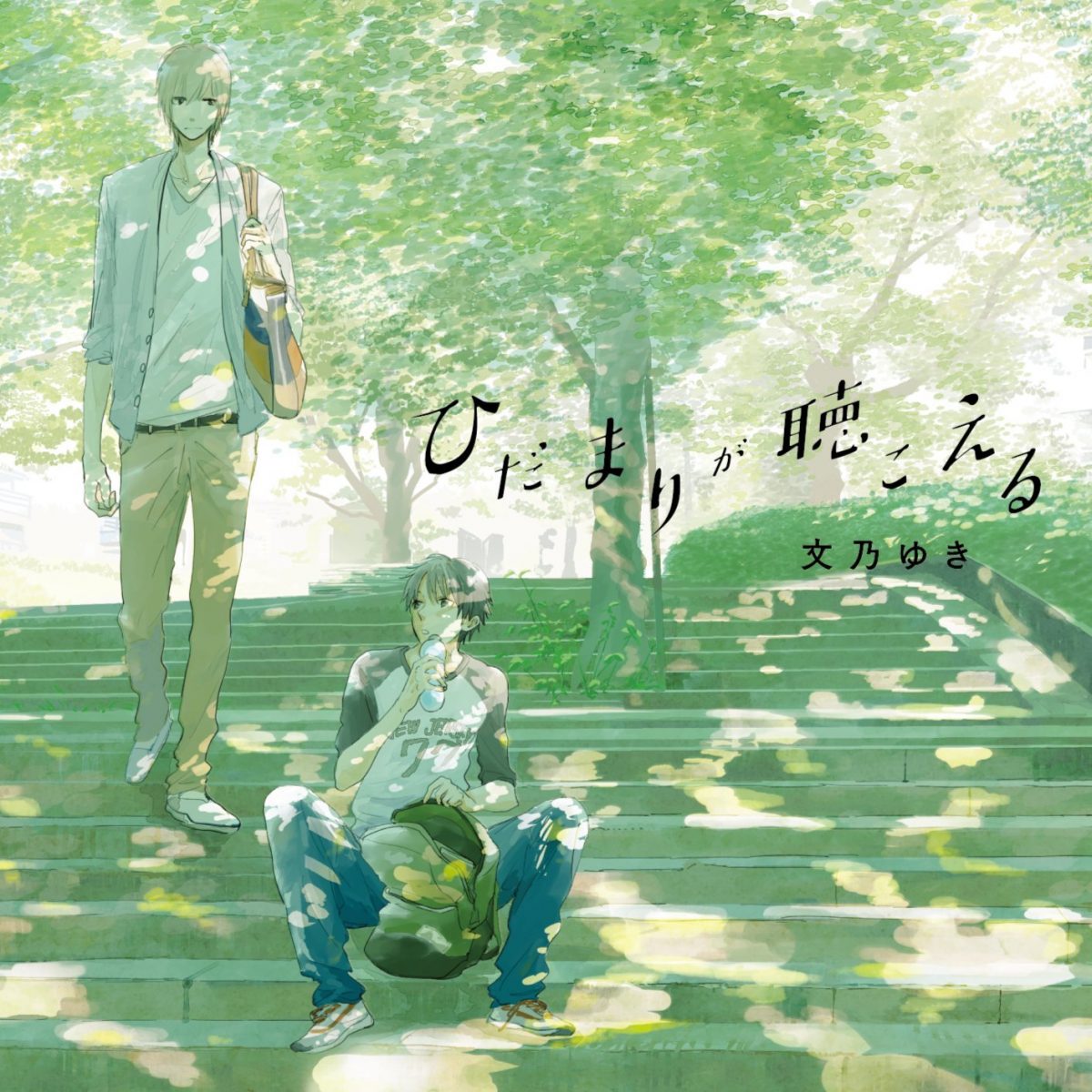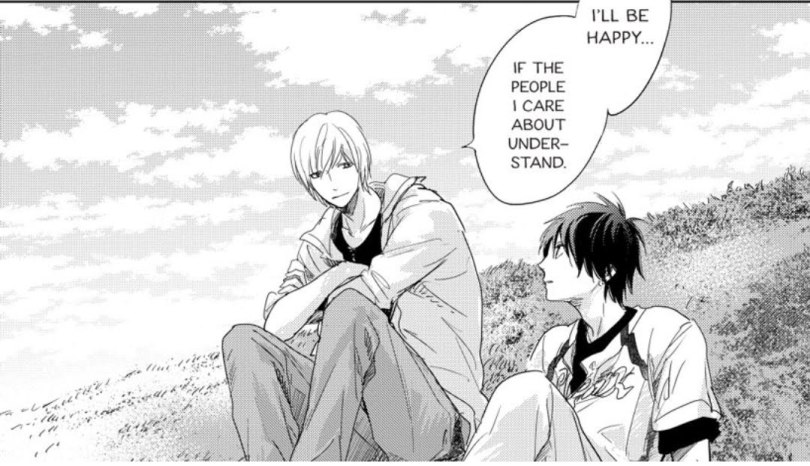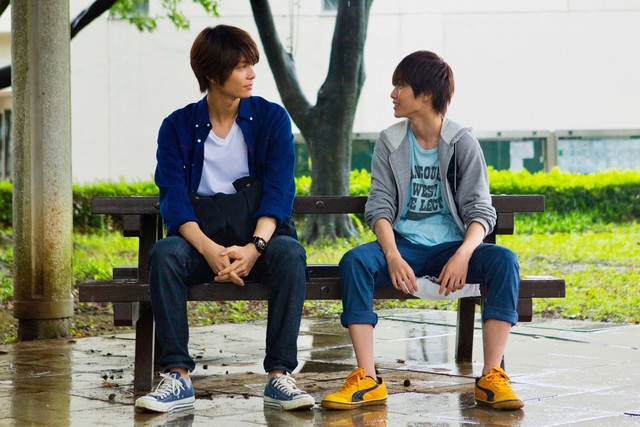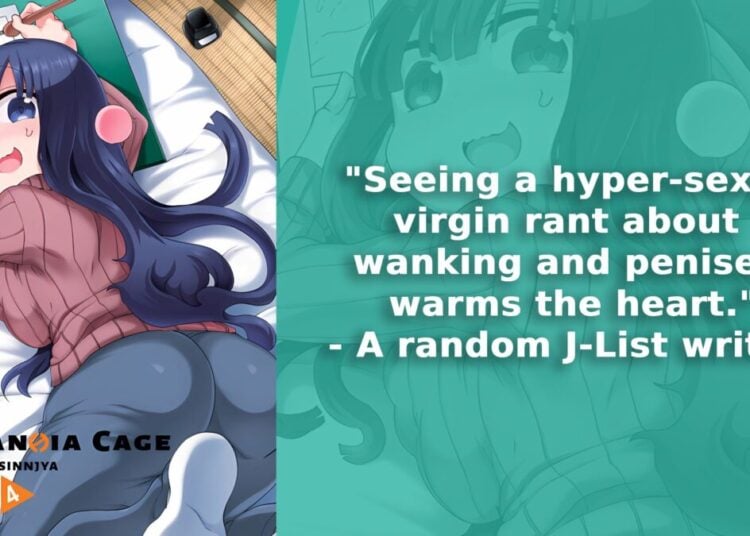Isolation, loneliness, and communication. Those are the themes of Fumino Yuki’s boy’s love series, I Hear the Sunspot. With 2020 having been a big year for BL fans, it looks like the current year, unfortunately, will be very bare-bones. That’s at least until spring when we get the long-awaited new Twittering Birds Never Fly OVA with volume seven of the manga. Until then, we’re trying something new, with some manga reviews! Originally, I had only planned on reading the first two volumes of the manga, but decided to go all the way and read everything available. Let’s get right into it.
Mild spoilers ahead.

To kick things off, I Hear the Sunspot is a soft and heartfelt drama moving at a much slower pace than a lot of other BL stories we’ve covered in the past. Fumino-sensei has a clear story they want to tell and is more than patient with themselves in telling it — not quick to rush relationship development or story arcs for the sake of any climactic sex scene. In fact, I Hear the Sunspot doesn’t have any sexual content at all.
Our story begins with loud-mouth Taichi Sagawa falling off a cliff and landing right on the roof of someone’s house. There he happens to meet his hearing-impaired college classmate, Kouhei Sugihara. The first impression gives off a typical “opposites attracted” setup, but the execution has much more to it. Distracted, and surprised by each other, they begin talking. Thanks to his eccentric energy and robust voice, Kouhei notes Taichi to be easy to understand. Taichi, not at all disturbed by Kouhei’s disability, continues to treat him normally. Upon learning about Kouhei’s struggle with taking notes in class, he agrees to help him in his spare time in exchange for Kouhei’s amazing cooking.

As I Hear the Sunspot unfolds, their friendship develops in a way where their characterization feels natural. Taichi is quick to invite and include Kouhei in activities with his other friends and treats him no differently. He doesn’t baby Kouhei, or treat him like a helpless animal — which contributes to Kouhei being the first to begin falling in love.
The first volume covers a wide array of topics related to disabled people, ranging from isolation issues, difficulty connecting to those without disabilities, and even the fetishization of being a disabled person’s caretaker. Fumino-sensei puts so much more focus on social issues and the mistreatment of the disabled than they do on the romance aspect that the story feels like it could have been told with a heterosexual couple and nothing would have needed to be changed.

The second story arc, titled I Hear the Sunspot: Theory of Happiness has similar high points, as well as low points when Taichi questions his capabilities of being Kouhei’s lover, and even if their friendship is worth continuing when a new character, Maya, is introduced. She creates the typical yaoi story trope of a female character coming between the main couple, all because she has more in common on paper with the protagonist’s love interest. Maya is hearing-impaired, and thus able to connect to Kouhei on a level that Taichi can’t understand.
Maya adds to the conflict almost to the point of obnoxiousness when showing up out of nowhere to put an end to emotional conversations between Taichi and Kouhei. She even disregards Kouhei’s own wishes for privacy all for the sake of trying to force romantic connections that we, the audience, know aren’t going to happen. Although this story arc was published about five years ago, at this point these kinds of plot device characters are tastelessly cliched and lazy.
The only thing missing is the classic internal monologue of either Taichi or Kouhei doubting their whole relationship “because we’re both guys.” The absence of such is actually a relief, indicating that Taichi and Kouhei are comfortable with their sexuality and slow-burning romantic attraction, despite showing no interest in men prior to their meeting.

Maya’s character does have redeeming qualities by the end of the second volume. I Hear the Sunspot: Theory of Happiness slows down for a bit to better explain her struggle growing up, and we see she had a very different situation compared to Kouhei for the majority of her life. Her relationship with Taichi brings up the societal issue of the hearing-impaired being divided from the legally deaf, and questions why they are sometimes treated differently, and if it’s really necessary. Maya’s story brings up issues such as victim-blaming, and the effects of silencing people’s struggles just because “others have it worse.”

The third story arc is told over three volumes, titled I Hear the Sunspot: Limit. Here, the author does the unexpected in the fact that focus is taken away from the main couple, and put on Taichi and Kouhei’s relations with their individual peers. By doing so, Fumino-sensei gives a more realistic approach to character development by allowing both characters to be shaped and grow through means other than their romantic involvement — something I think is lacking in many BL series. Some mangaka will give a glimpse of a character’s work-life, but ultimately let the office/flower shop/book store/etc. be exclusively for isolated thoughts and showcasing emotional struggle — never personal growth or founding new friendships.
Taichi goes on a work retreat with everyone from his office and the life-values he learns from his coworkers end up playing a part when he reunites with Kouhei after. Meanwhile, Kouhei becomes more involved with his university sign language club and meets others with a more unique, even harsher perspective of being deaf rather than hearing-impaired, filling him with doubt as to whether he is truly comfortable with the state of his disability.
Volume three of Limit is scheduled for release in English this April. Fumino-sensei confirmed on their Twitter account in 2019 that I Hear the Sunspot: Limit had been finished. Recent postings have confirmed that a follow-up series is underway. Outside of the manga, the first volume was adapted into a live-film in 2017.

I Hear the Sunspot is tender, sweet, and endearing all around. Taichi may at times come across as a typical loud-mouth archetype, but the story told with him leaves a smile on your face and a small tear in your eye, every chapter. Fumio-sensei, we can’t wait to see the rest!
I Hear the Sunspot and I Hear the Sunspot: Limit is available now from One Peace Books on Amazon and wherever fine books are sold near you!















